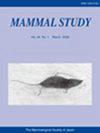利用无创采样和分子技术对伊朗豹的个体鉴定——以Parvar保护区为例
IF 0.8
4区 生物学
Q3 ZOOLOGY
引用次数: 0
摘要
摘要波斯豹(Panthera pardus saxicolor)是一种濒危物种,广泛分布在伊朗各地。粗略估计,该国居住着550-850只波斯豹,占其全球数量的三分之二以上。对伊朗这种大型食肉动物的种群监测是当前保护规划的主要目标之一。因此,迫切需要采用更多样化的方法来实现可靠、具有成本效益和务实的措施。我们通过粪便取样和分子工具对Parvar保护区的波斯豹进行了个体鉴定研究,并试图测试这种方法的可行性。我们使用了12个先前报道的多态微卫星位点,其中只有5个符合基因分型分析的条件。最后,确定了9只豹。我们测量了这五个位点通过P(ID)兄弟姐妹区分个体的能力。估计兄弟姐妹个体的累计观察同一性概率和同一性概率分别为0.005和0.05。本研究提供的豹子空间分布数据有助于更好地了解该物种的行为生态学和保护生物学。此外,我们的研究结果将有助于未来的研究开发大规模研究的方法,并为有效的野生动物保护提供数据。本文章由计算机程序翻译,如有差异,请以英文原文为准。
Individual Identification of Panthera pardus saxicolor Using Non-Invasive Sampling and Molecular Techniques in Iran: A Case Study in Parvar Protected Area
Abstract. The Persian leopard (Panthera pardus saxicolor) is an endangered species widely distributed across Iran. Rough estimates indicate 550–850 Persian leopard individuals inhabit the country, which comprises more than two thirds of its global population. Population monitoring of this large carnivore in Iran is one of the main objectives of current conservation planning. Therefore, adopting a more diversified methodology to achieve reliable, cost-effective, and pragmatic measures is urgently needed. We conducted a study for individual identification of the Persian leopard in Parvar Protected Area via fecal sampling and molecular tools and attempted to test the feasibility of this approach. We used 12 previously reported polymorphic microsatellite loci, of which only five were qualified for genotyping analysis. Finally, nine leopard individuals were identified. We measured the ability of the five loci in distinguishing individuals by P(ID)sib. The cumulative observed probability of identity and probability of identity for sibling individuals were estimated to be 0.005 and 0.05, respectively. Data presented on spatial distribution of leopards in this study could help better understand the behavioral ecology and conservation biology of the species. Moreover, our findings will assist future research in developing methodologies for large-scale studies and providing data for effective wildlife conservation.
求助全文
通过发布文献求助,成功后即可免费获取论文全文。
去求助
来源期刊

Mammal Study
ZOOLOGY-
CiteScore
1.70
自引率
20.00%
发文量
23
审稿时长
>12 weeks
期刊介绍:
Mammal Study is the official journal of the Mammal Society of Japan. It publishes original articles, short communications, and reviews on all aspects of mammalogy quarterly, written in English.
 求助内容:
求助内容: 应助结果提醒方式:
应助结果提醒方式:


